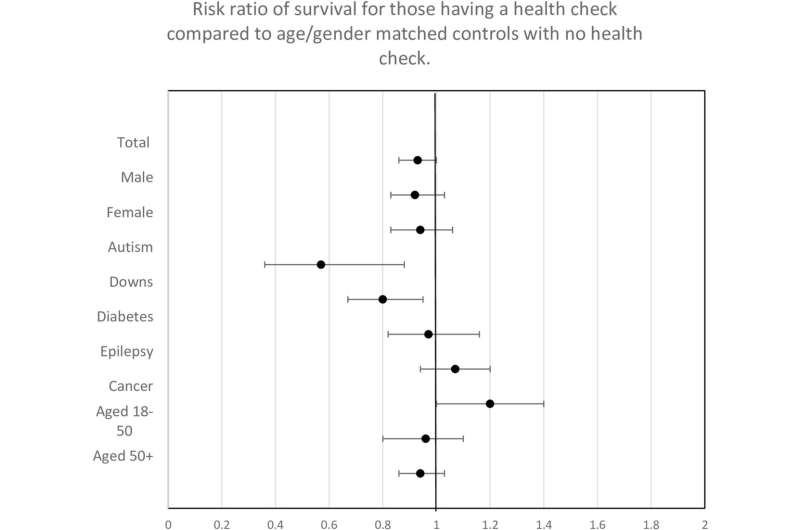Health checks make life-saving difference for people with a learning disability

Welsh researchers have found that health checks help improve survival for people with a learning disability, especially those with autism or Down's syndrome.
The team, led by researchers at the National Centre for Population Health & Wellbeing Research, based at Swansea University, analyzed the medical records of 26,954 people with a learning disability in Wales between 2005 and 2017.
People with a learning disability experience more health conditions such as epilepsy, autism, and dental problems and are at a higher risk of leading sedentary lives and becoming overweight, subsequently developing diabetes, cardiovascular disease, and respiratory disease.
They are also more likely to be exposed to poverty, poor housing conditions, unemployment, and other social causes of poor health.
Annual health checks for people with a learning disability were introduced in Wales in 2006 to improve early detection and treatment. However, the lack of evidence about the long-term health benefits of providing these checks has resulted in many GPs not offering them.
The researchers, from both Swansea and Cardiff universities, looked to address that lack of evidence and explore whether health checks are associated with better survival and lower mortality rates. Their findings have just been published by online journal BMJ Open.
The team used the Secure Anonymised Information Linkage (SAIL) databank to examine the medical records of the total population of people with an intellectual disability in Wales. This study included Welsh GP data, hospital in and out-patient records along with death records collected by the Office of National Statistics (ONS).
The data revealed:
- Having a health check was associated with reduced deaths for people with autism and those with Down's syndrome;
- There was little evidence of reduced death rates for those diagnosed with diabetes or epilepsy;
- There was no evidence to indicate that health checks improved outcomes for people diagnosed with cancer;
- Many people may have received one health check but not undergone annual checks; and,
- There was a lower than expected uptake of health checks among the Welsh adult population—more than 70% had no record of having a health check.
Professor Sinead Brophy, Director of the National Centre for Population Health & Wellbeing Research and lead researcher on the study, said: "The low uptake of health checks in Wales is concerning, especially as we come out of the pandemic.
"Adults with learning disabilities are not being offered health checks either because they are not recognized as eligible or because there is a barrier to accessing health checks.
"Communication and uptake of health promotion information can be challenging for people with learning disabilities. So, reaching out to families and carers with clear messages on the benefits of health checks could positively impact their uptake—leading to better health outcomes and quality of life for people with learning disabilities living in Wales."
Senior Improvement Manager, Learning Disability Improvement Cymru, Paula Phillips, said: "We know health checks improve health outcomes, however, this is the first paper to identify improved survival for people with autism who have a learning disability and people with Down's syndrome.
"We are offering support to services across Wales to increase the uptake and quality of health checks for people with a learning disability. We can now use these important findings to promote the importance of health checks to people who have a learning disability, those who provide support to people to access health checks and those who deliver health checks."
More information: Natasha Kennedy et al, Health checks for adults with intellectual disability and association with survival rates: a linked electronic records matched cohort study in Wales, UK, BMJ Open (2022). DOI: 10.1136/bmjopen-2021-049441



















